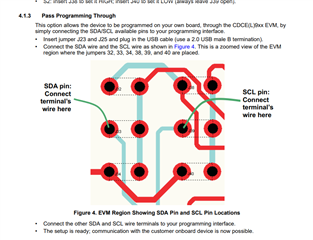Part Number: CDCEL925
Other Parts Discussed in Thread: USB2ANY, , LMK03318
Tool/software:
Hi,
I would like to be able to program CDCEL925 using the the I2C protocol with the USB2ANY. I am using the USB2ANY since my end application uses the LMK03318 and CDCEL925. The LMK03318, I think, can be programmed with the TICS Pro. I have been told in a different thread that I may need to write my own software for programming the CDCEL925 with the USB2ANY. Can you please give me some pointers to get started?
Thanks.


